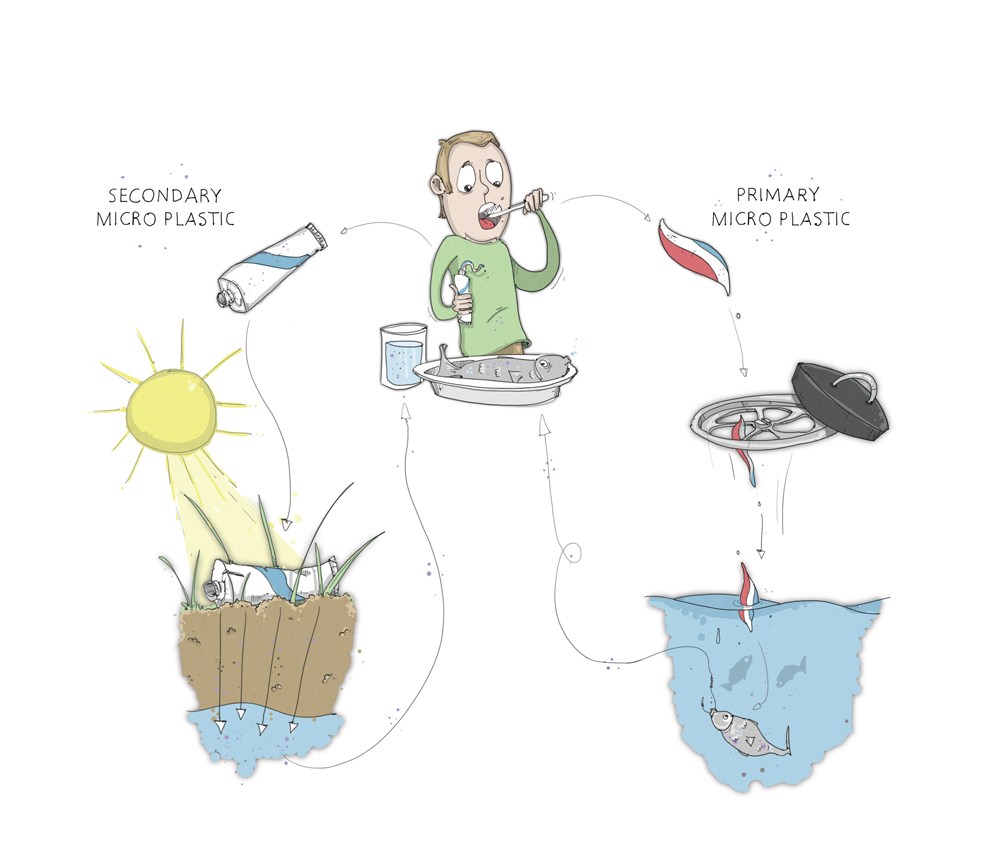A new study from the World Wildlife Federation suggests we are ingesting an average of 5 grams of plastic every week. The plastic we are ingesting is from particles smaller than five millimeters. These “microplastics” are making their way into our food, drinking water and even the air.
A study by the University of Newcastle, in Australia says that people across the world ingest around 2,000 microplastic particles every week! These minuscule particles can originate from many sources. The biggest culprits are clothes made with artificial fibers and home care products such as toothpaste, cleansers, and exfoliants. Bigger pieces of plastic litter will gradually break into smaller pieces when they are exposed to the elements.
These tiny plastic particles find their way into our streams, rivers and oceans, and can be eaten by fish and other marine animals, ending up as part of the food chain. Microplastics have been found in a great many foods and beverages, such as water, beer, seafood and salt.

The Environment Agency Austria conducted a study eight of human stools to determine if microplastics were making it into our bodies. They tested participants from Europe, Japan and Russia. All of their stool samples were found to contain microplastic particles. Based on this study, the authors estimated that “more than 50% of the world population might have microplastics in their stools”, though they stressed the need for larger-scale studies to confirm this.
This past January the European Union places a wide-ranging ban on microplastics covering about 90% of pollutants. It has been proposed by the EU in an attempt to cut 400,000 tonnes of plastic pollution in 20 years.

To find out more about microplastics in the basins that lead to the Gulf of Mexico in Texas, check out this 2015 graduate thesis by Texas State University’s MB Phillips titled:
Occurrence and amount of microplastic ingested by fishes in watersheds
of the Gulf of Mexico
What Can You Do?
The organization Ocean Clean Wash is attempting to close the loop of microfiber pollution from synthetic clothes: they are tackling each step of the value chain and looking for solutions. They expect a reduction of 80% of synthetic microfiber release in the coming years. In order to do this, they have gathered stakeholders from each stage of the product lifecycle that has shown interest in working on and promoting solutions.
In the meantime, there are currently some initiatives coming from environmental minded, grass roots entrepreneurs. We promote these solutions as they contribute to solving the problem of microfiber release into the environment.
- PlanetCare is the developer of one of the best solutions to date: a thoroughly tested washing machine filter that catches at least 80% of the released plastic fibres before they disappear down the drain.
Other Clever Solutions
- Guppy Friend washing bag from Langbrett
- Cora Ball, microfiber-catching laundry ball
- Filtrol 160, washing machine lint filter
- Lint LUV-r, washing machine discharge filter
- Xeros Technologies, washing machine filter
Home Care Products
Beat the Microbead has put together comprehensive lists for every country of the products which are safe and contain no microplastics